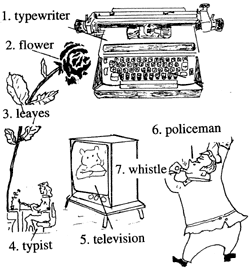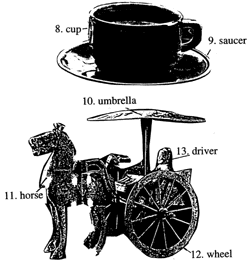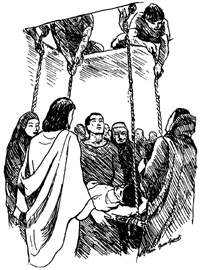Unit 31: Adverbs of Degree
程度の副詞
Pictured Words
描かれた単語
New Words
新しい単語

| 1.typewriter
タイプライター |
| 2.flower
花 |
| 3.leaves
葉 |
| 4.typist
タイピスト |
| 5.television
テレビ |
| 6.policeman
警官 |
| 7.whistle
口笛を吹く |

| 8.cup
カップ |
| 9.saucer
ソーサー |
| 10.umbrella
傘 |
| 11.horse
馬 |
| 12.wheel
ホイール |
| 13.driver
ドライバ |
Nouns
名詞
援助
ベッド
キャンバス
コップ
下水管
羽
インフルエンザ
インク
動き
ペーパー
ポスト
スケール
秘書
微笑
スポンジ
テレビ
理論
大学
ビデオ
ウイルス
笛
Sayings
格言
My cup is so full.
私のコップはとても完全である。
Influenza is a virus that puts one in bed for so long before getting well again.
インフルエンザはそうのためのベッドに再度よく得ることのずっと前に1 つを置くウイルスである。
Aids is not the only virus that makes us so very weak and tired.
援助は私達をそう非常に弱く、疲れたようにする唯一のウイルスでない。
That university had its beginning in only a canvas tent.
その大学にキャンバスのテントだけで初めがあった。
How the secretay smiled as she took the sponge and wiped off the ink from that very paper.
微笑するsecretay いかに彼女がスポンジを取り、その非常にペーパーからのインクをふき取ったように。
How clearly will we be able to see the video or television to night?
私達はいかにはっきり夜にビデオかテレビを見られるか。
The only flow in this drain is so slow as to be like a sponge.
この下水管の唯一の流れはスポンジのようとても遅いに関してである。
The very cup from which the chief drank before he went to bed.
彼が寝た前に責任者が飲んだまさにコップ。
Adverbs of Degree
程度の副詞
The degree with which an action is expressed may be seen in the words: "how", "very", "only" or "so":
行為が表現される程度は単語で見られるかもしれない: 、"非常に" 、"ただ" または"そう" か"いかに":
How
いかに
how is it possible?
それはいかに可能であるか。
how may the son of woman be upright?
いかに女性の息子は直立してもよいか。
how long will you make my life bitter .
私の生命を苦くどの位させるか。
how the evil man goes free.
邪悪な人がいかに自由に行くか。
how he makes the light of his cloud to be seen.
彼が見られるべき彼の雲のライトをいかに作るか。
Very
非常に
at the very thought of it.
それのまさに思考。
you are very old.
非常に古い。
they saw that his pain was very great.
彼らは彼の苦痛が非常に大きかったことを見た。
Only
ただ
only two things do to me.
2 つの事しか私にしない。
only put your hand on him.
しか彼にあなたの手を置いてはいけない。
only do not put a finger on the man himself.
人に指彼自身を置いてはいけないだけ。
So
そう
and so a hollow-minded man with set wisdom.
そしてそうセットの知恵の空気にされた人。
so that he may have pleasure.
彼が喜びを有するように。
so man goes down to his last resting place.
そう人は彼の最後の休息場所に行く。
so that he may give decision.
彼が決定を与えるように。
so I came out in the hope of meeting you.
そう私は会合を希望して出て来た。

Let Down Through The Roof
屋根を通って
And it came about that on one of these days he was teaching;
そしてそれはそれについて来たそのうちに彼が教えていた;
and some Pharisees and teachers of the law were seated there, who had come from every town of Galilee and Judaea and from Jerusalem;
そしてGalilee 及びJudaea のあらゆる町とエルサレムから来た法律の何人かのPharisees そして教師はそこに着席した;
and the power of the Lord was with him, to make those who were ill free from their diseases.
そして彼らの病気から病気自由にだった人々を作る主の力は彼と、あった。
And some men had with them, on a bed, a man who was ill, without power of moving;
そして何人かの人にそれら、ベッドで、病気だった移動の力のない人がと、あった;
and they made attempts to get him in and put him before Jesus.
そして彼らは彼を得、イエス・キリストの前に置く試みを作った。
And because of the mass of people, there was no way to get him in;
そして人々の固まりのために、彼を得る方法そうなったものでなかった;
so they went up on the top of the house and let him down through the roof, on his bed, into the middle in front of Jesus.
そう彼らは家の上で行き、屋根を通してイエス・キリストの前の中間に彼を、彼のベッドで、許可した。
And seeing their faith he said, Man, you have forgiveness for your sins.
そして信頼を見て彼は、持っているあなたの罪のための許しを言ったり、人を配置する。
And the Scribes and Pharisees were having an argument, saying, Who is this, who has no respect for God?
そして筆記者はおよびPharisees に議論、神のための点を有しない、これである格言があっていた、か。
who is able to give forgiveness for sins, but God only?
だれが罪のための許し、しかし唯一の神を与えられるか。
But Jesus, who had knowledge of their thoughts, said to them, Why are you reasoning in your hearts?
しかしイエス・キリストにのだれそれらに思考の知識が、言った、なぜ推論であるあなたの中心のあったか。
Which is the simpler: to say, You have forgiveness for your sins;
より簡単はであるかどちら: 言うためには、あなたの罪のための許しを有する;
or to say, Get up and go?
または言うために、起き、行きなさいか。
But so that you may see that on earth the Son of man has authority for the forgiveness of sins, (he said to the man who was ill,) I say to you, Get up, and take up your bed, and go into your house.
地球で人の息子に罪の許しのための権限があることをしかし見るように、(彼は病気だった人に、) 言った私はあなたに言い、起こし、そしてあなたのベッドをと、そしてあなたの家に入る。
And straight away he got up before them, and took up his bed and went away to his house giving praise to God.
そして早急に彼はそれらの前に起き、彼のベッドをと、そして神に賞賛を与える彼の家に出かけた。
And wonder overcame them all, and they gave glory to God;
そして驚異はそれらをすべて克服し、神に栄光を与えた;
and they were full of fear, saying, We have seen strange things today.
そしてそれらは恐れ、格言の完全、私達今日見てしまった奇妙な事をだった。
Additional Reading
付加的な読書
Anyone who has seen houses in dry countries will have a good idea of how they are made.
乾燥した国の家を見ただれでもいかにの作られるかよい考えがある。
It is quite the normal thing to put large pieces of wood parallel across the roof.
それは屋根を渡って平行木の大きい部分を置く正常な事かなりである。
Then, the spaces between them have branches put in and kept there by hard earth to keep out any rain that may come.
そして、それら間のスペースに置かれ、来るかもしれないあらゆる雨から保つために堅い地球によってそこに保たれる枝がある。
There is a small slope for draining off the rain.
雨を離れて流出のための小さい斜面がある。
That was the sort of roof made on this house.
それはこの家でなされた一種の屋根だった。
So, it was very simple to take out the mud and let this man into the house by the roof.
そう、それは泥を取り非常にやすく、家に屋根によってこの人を可能にした。
Nor was it uncommon for that to be done.
されることそれのために珍しいそれはあった。
Boxes for the dead were often let into the house in that way.
死者のための箱は頻繁にそういう風にの家に許可された。
The thing that was different was the fact that the man's friends went to so much trouble.
異なっている事は人の友人が悩むことをそんなに行ったという事実だった。
They had faith.
彼らは信頼を有した。
Now, Jesus often said that without faith no help could be given.
今、イエス・キリストは頻繁に信頼なしで助けが与えることができないと言った。
It is surprising how often he said to people your faith has made you well.
それはどの位の割りで彼がよく作ったあなたの信頼に民を住まわせると言ったか意外である。
When he made the observation of their faith he said, "You have forgiveness for your sins".
彼が彼が言った信頼の観察をしたときに、"あなたの罪のための許しを" 有する。
We may wonder why he made this statement first.
私達は彼がこの声明をなぜ最初にしたか疑問に思うかもしれない。
It was because there was a deeply seated belief in that day that illness was the reward of sin.
それは病気は罪の報酬だったことその日に深く取付けられていた確信があったのであった。
So strong was this belief that the ill person felt in the grip of some sin or other and so could never be made well.
とても強かった罪または他のグリップの病気人のフェルトが及びそう決してよく作ることができないこの確信は。
Jesus first gave the man a completely new thought and his faith became stronger.
イエス・キリストは最初に人に完全に新しい思考を与え、彼の信頼はより強くなった。
This also took away the grip of the teachers of the law.
これはまた法律の教師のグリップを取り去った。
They had all sorts of rules that were hard to keep.
彼らは保ちにくかった各種各様の規則を有した。
For example, they said that to make people free from their diseases on the Sabbath was a sin.
例えば、彼らはそれをSabbath で人々を彼らの病気から自由にさせることは罪だったことを言った。
They said this could be done only if the person's life was in danger.
彼らは人の生命が危険にあったときだけこれがすることができることを言った。
It was possible to keep the person from getting worse, but not to do anything on the Sabbath which made him healthy.
より悪くなることからの人を保つことは、彼を健康にさせたSabbath の何もしないことは可能だったが。
So you could put a simple cover on a wound but not give any medical help.
そう傷に簡単なカバーを置き医学の助けを与えないことができる。
It was also said by these teachers that to take up any kind of material on the Sabbath was against the law.
それはまた種類のSabbath の材料をとることは法律に対してだったこれらの教師によって言われた。
So, they said that it would be wrong for the man to take up his bed.
そう、彼らは人が彼のベッドをとることは間違っていると言った。
Still more important was the idea that only God was able to give forgiveness for sins.
まだより重要唯一に神が罪のための許しを与えられたという考えはだった。
To them this was the greatest of all the errors.
それらへのこれはすべての間違いの最も大きかった。
We must not be surprised, then, that the people were very happy to see themselves free of the crushing conditions that they had been given by these hard to keep laws.
私達は法律を保つことこれらの堅いによって与えられたこと人々が押しつぶす条件の彼ら自身を自由に見て非常に幸せだったこと、そして驚いてはならない。
and they were full of fear, saying, "We have seen strange things today".
そしてそれらは恐れ、格言の完全、"私達今日見てしまった奇妙な事を" だった。
The teachers of the law, however, were not so happy.
しかし法律の教師はあまり幸せでなかった。
This was not only putting their laws in doubt, it was also making their authority less certain.
これはまた疑い、それでしか法律をさせていた権限をより少なく確信していなかったを。
From then on they took special steps to see that they got free of the teachings of Jesus.
そしてそれらはからイエス・キリストの教授の自由になったことを見るために特別なステップを踏んだ。
In fact, at the last they sent him to the cross for the division that came about between their teachings and his desire to give every man a rest from such detailed controls.
実際は、最後でそれらはあらゆる人にそのような詳しい制御からの残りを与える教授と彼の欲求の間に約来た部分のための十字に彼を送った。
Helpful Notes
有用なノート
| Pharisees and teachers of the law
法律のPharisees そして教師 | the religious leaders.
宗教リーダー。 |
| Galilee and Judaea
Galilee 及びJudaea | places in Palestine.
パレスチナの場所。 |
| power of moving
移動の力 | ability to move the parts of the body.
ボディの部分を動かす能力。 |
| forgiveness for sins
罪のための許し | removal of blame for wrong doing.
間違ったすることのための責任の取り外し。 |
| draining off the rain
雨を離れて流出 | letting water run away to the ground.
地面に動くように水がする。 |
| boxes for the dead
死者のための箱 | units for persons who have died.
死んだ人のための単位。 |
| crushing conditions
押しつぶすことは調節する | hard systems to put up with.
我慢されるへのハードシステム。 |
| putting in doubt
疑いに置くこと | making of little effect.
僅かな影響の作成。 |
Interesting Facts and Records.
興味深い事実および記録。
Luke, The Medical Man
ルークの医学人
There is a story from the time of the Romans that Luke was a painter.
ルークがペインターだったことRomans の時から物語がある。
That is, he put oils and paint onto canvas to make a picture.
すなわち、映像を作るために彼はキャンバスにオイルそしてペンキを置いた。
There is a painting of Mary, the mother of Jesus, in a big church in Spain.
メリーの絵画、スペインの大きい教会のイエス・キリストの母が、ある。
It is said that it was the work of Luke.
それがルークの仕事だったことが言われる。
Luke was the only writer of books in the New Testament who was not a Jew.
ルークはユダヤ人の新約聖書の本の唯一の作家だった。
He was probably a Greek, for he wrote very good Greek.
彼はギリシャ人おそらくだった、なぜなら彼は非常によいギリシャ語を書いた。
But, his finest quality is that he was a medical man who kept good records.
しかし、彼の最も良い質は彼がよい記録を保った医学人だったことである。
When he put pen to paper, it was with care.
彼がペーパーにペンを置いたときに、心配とあった。
We have no knowledge of his training.
私達は彼の訓練の知識を有しない。
There were no universities or hospitals as we have them now.
私達にそれらが今あるので大学または病院がなかった。
The most common illness in those parts was malaria.
それらの部品の共通の病気はマラリアだった。
Such things as influenza had another name, and Aids and viruses were not known.
インフルエンザに別の名前があったそのような事、および援助およびウイルスは知られなかった。
In his training, he would have had real life experience with an older teacher.
彼の訓練では、彼はより古い教師を含む実際の経験を有しよう。
The writings of Luke were mainly for other ethnic groups than the Jews.
ルークの執筆はユダヤ人より他の民族グループのため主にだった。
These had the name, "Gentiles".
これらは名前を、"Gentiles" 有した。
Both the Gospel and the Book of Acts were written for a Roman with a high scale position in the Government.
行為の福音そして本は両方政府の高いスケールの位置とのローマのために書かれていた。
There were hardly any records taken from the Old Testament.
旧約聖書から取られたほとんど記録がなかった。
Luke wrote without much theory.
ルークは多くの理論なしで書いた。
It was for the every day person.
それは毎日人のためだった。
Luke said that Jesus often spoke with God.
ルークはイエス・キリストが頻繁に神と話したと言った。
He then set in motion important steps like choosing his followers.
彼は彼の従節の選択のような動きの重要なステップでそれから置いた。
At that time, women had a low position in the social scale.
その時に、女性に社会的なスケールの低い位置があった。
A Jew had a morning saying: "I thank God I have not been born a Gentile, I am not in servitude and I am not a woman".
ユダヤ人に朝の格言があった: "私は私がGentile 耐えられなかった神に感謝する、私は強制労働にないし、女性" でない。
That was a true picture of the low position of women at that time.
それはその時に女性の低い位置の実物写真だった。
But, Luke had a higher view.
しかし、ルークにより高い眺めがあった。
His words about women were said with a smile.
女性についての彼の単語は微笑と言われた。
He spoke of the widow at Nain and the woman who put a sweet perfume on Jesus feet.
彼はNain でイエス・キリストのフィートに甘い香水を置いた女性および寡婦の話した。
Luke was a special friend of Paul on his long journeys.
ルークは彼の長い旅行のポールの特別な友人だった。
He was true to him even in prison.
彼は刑務所の彼に本当だった。
No doubt he put the sponge to work on his back when the whips had whistled about him.
疑い彼は鞭が彼について笛を吹いたときに彼のに取り組むためにスポンジを置かなかった。
Only Luke has told us of the loss of the ship at an island in a wild sea.
ルークしか野生の海の島で船の損失の私達に言わなかった。
That would make an interesting video or television movie now.
それは興味深いビデオまたはテレビ映画を今作る。
These two men took their drinks from the same cup and put their beds beside each other, whether with comfort or not.
この2 人は同じコップからの彼らの飲み物を取り、との互い、かどうか慰めの側の彼らのベッドを置いた。
Luke was Paul's secretary who put his feather pen to paper to give us accounts that now make easy reading because he wrote for persons like us.
ルークは私達に彼が私達のような人のために書いたので今容易な読書をする記述を与えるためにペーパーに彼の羽のペンを置くポールの秘書だった。